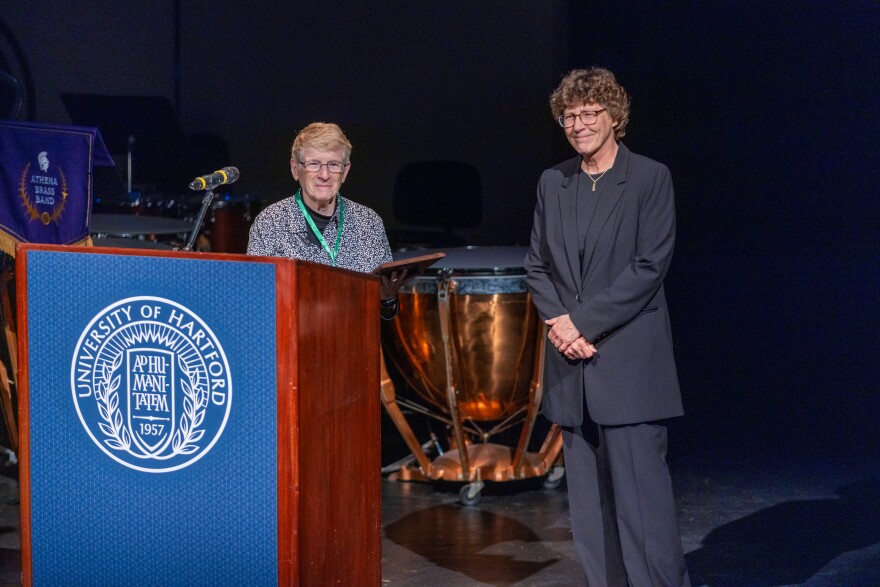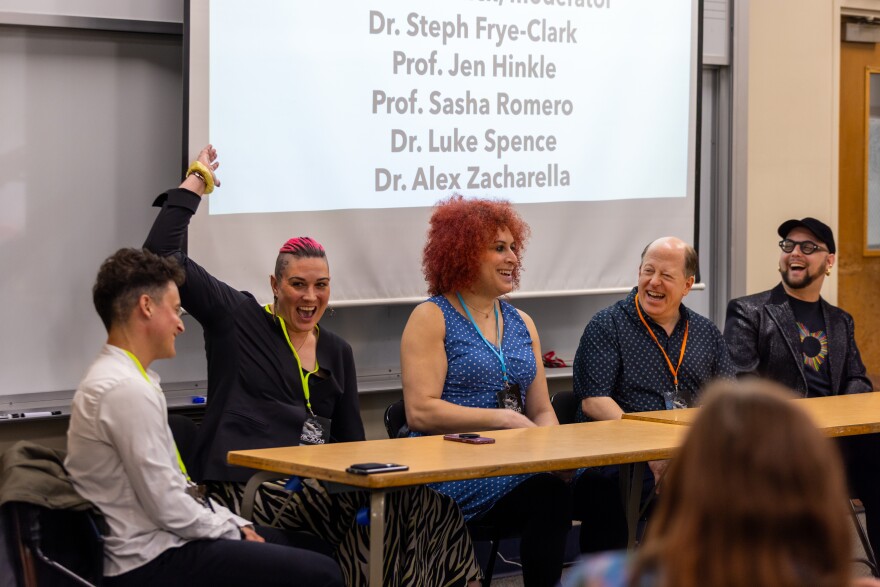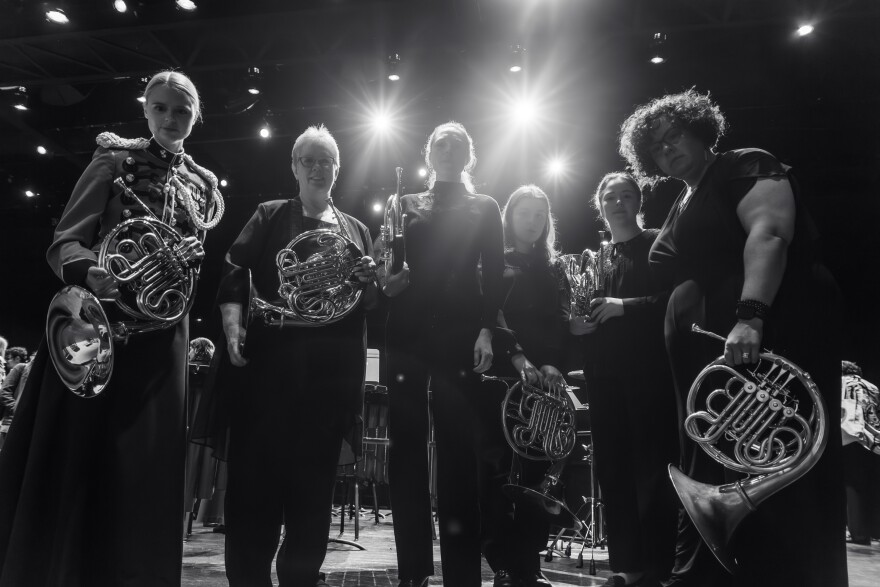The week after college graduation, most of the University of Hartford’s campus was calm; students had moved out of residence halls, and classrooms sat empty. Yet, the university’s performing arts conservatory was bursting with sound as this year’s International Women’s Brass Conference (IWBC) commenced.
The IWBC has been held in the United States, Canada, and even across the world in Japan. This year, the week-long event was held at the Hartt School. Hallways were filled with sound; players practicing on their trombones, horns, trumpets, and tubas, ensembles rehearsing for upcoming performances, and old friends catching up between lectures. Founded in 1993, the conference started as a means for women in brass music to connect at a time when they were few and far between professionally.
“It started out as wanting to meet other women brass players. We were isolated,” said Susan Slaughter, a founder of the conference. She knew first-hand how difficult it was to find other brass players who were women; as the principal trumpet player for the St. Louis Symphony for more than 15 years at the time of the conference’s founding, she was the only woman in the entire brass section for years.
“And it’s not [as if] there are a lot of women in brass sections of orchestras now,” she said.
By the time she finished playing with the St. Louis Symphony, Slaughter had been the principal trumpet for four decades; a feat for any player, let alone someone who had to jump through myriad hoops because of their gender. The story of how she managed to land an audition with the orchestra was told during a panel honoring other long-time women players; according to the account, Slaughter was only able to audition with the orchestra because she didn’t put her full name on the sign-up sheet. Rather, she only used her first initial – S. Slaughter could have been a man. If those running the auditions had known she was a woman, she wouldn’t have been allowed to try out.

Laughter filled the room after the reveal, because Slaughter and the panelists were laughing as they were telling it. The IWBC founder said it’s important to learn how to treat the kinds of circumstances she found herself in lightly; otherwise, the job can feel impossible.
“You have to learn how to [be] like a duck – water rolling off of your feathers, so to speak,” she said. “You have to choose how you're going to respond, and that's what life is about. It's about choices. So I can choose to be angry. I can choose to scream… or I can choose to just go on. So that's a little bit of what we try to teach.”
A community rattled
Slaughter’s preferred practice is easier said than done. Navigating both educational and professional environments has proven challenging for women brass players.
In most colleges and music conservatories, music students choose to attend a school based on the teacher for their instrument. Music students take weekly one-on-one lessons with their teacher, often a revered performer, which necessitates consistent and often private interaction.
For many musicians, this relationship is a positive one. But in the past year, more students have spoken out alleging harassment. At the same time, similar realities in professional environments have been revealed.
In November of 2024, reporting about sexual assault against women in the New York Philharmonic led to other professionals in the brass community speaking out about their experiences. Private social media groups for gender-marginalized brass players were filled with players’ recountings. A topic that was previously buried under power dynamics and fear of retaliation suddenly surfaced, years after the Hollywood #MeToo movement encouraged many abused and harassed performers to share their experiences.
Nearly every story posted in the private social media groups received an outpouring of positive comments, support for the original poster’s bravery, encouragement to report the incident or just a virtual hug.
Beth, whose identity is protected for both her personal and professional safety, is part of one of those social media groups.
A long-time brass player on the East Coast, Beth said she faced uncomfortable experiences almost immediately in her professional playing. Men in higher positions would comment unnecessarily on her body and the other women in the ensemble. She said these experiences came to a head when she landed a position playing in a military band. Soon after she began performing with the group, they went on tour. One evening, she said another player approached her.
“He goes, 'Man, you got a nice ass.' He's like, 'Would you ever consider…'" Beth said he propositioned her.
She told the man she was married, and he proposed sex again. She declined outright, but the interaction didn’t make the lewd comments stop. Eventually, a friend in the orchestra reported the experience to a supervisor; the other player denied that anything had happened. After that, Beth said her job became nearly impossible.
“Almost everybody in the band ignored me. They were bullying me,” she said. Beth explained that not only did others not believe her, but they also ostracized her.
“It was horrible, to the point where I ended up having a nervous breakdown… It definitely led to some substance use issues with alcohol. It led me to disassociate from everybody. I ended up getting divorced… And I was just like, I’ve got to get out of here. I cannot do this.”
But as a member of a military band, she didn’t have the option to leave. She said she was obligated to fulfill her contract, which was four years long. She said she had to endure a painful work environment for another two years before she could leave.
“I knew by then, two years in, and probably within six months, actually, that it was a good old boys club… You’re stuck there.”
Years after leaving the military band, Beth still plays her instrument and loves doing it. But she moves through the community differently; she avoids certain gigs, and said she’s still informally blacklisted from auditioning for certain symphonies in her area.
According to Beth, even when she escaped direct harassment, the brass community is so small that the past followed her. Yet, she wanted to share her story because she knows it’ll help others who have faced the same situation she did. And for those who have been unaware of the harassment and abuse in orchestral communities, she hopes her story will help motivate them to make a change.
“I really just wish people were more aware of these injustices,” she said. “And more men standing up for women's rights would really be helpful, rather than joining in on the jokes.”
Musicians become the audience
Haim Avitsur, a trombone player and associate professor at the Hartt School in Hartford, Conn., helped host this year’s International Women’s Brass Conference. He was one of many men who either supported or attended the conference this year.
According to Avitsur, he knows how important it is to amplify women’s experiences in the brass community, especially after the news broke earlier this year about harassment and assault in a major national orchestra. Helping organize this year’s conference was one way of achieving that goal.

“We're having so much fun. We're creating music. We're all here because we love blowing air through a pipe. Everybody is excited, everybody is laughing,” he said. “But in the background, we know that we are supporting something that is now developing.”
When he first heard about sexual harassment in orchestras and music schools, Avitsur checked himself.
“When things come out and there are these huge articles… I have to look at myself and say, 'Well, I'm a white male. And I'm the face of music history from the past 450 years. Did I behave correctly?'"
He asked his past students about their experiences; had he ever misstepped? Had he overlooked a co-worker acting inappropriately? The feedback he received from them was completely positive. But he knew some women were facing harassment.
“I need to hear [those] stories so then I can see another situation and say, “This is very similar. [It] needs to stop.”
As a male playing a brass instrument, Avitsur knows where he fits into these developments in his community, as an audience member.
“It's important for me to not speak, but to listen. I'm here to listen. I am the host, but I'm a supporter. I know my place in the world.”
The IWBC is just one space of many for the brass community to share their experiences and grow together.
Lisa Ford, who acts as the principal horn player of the Gothenburg Symphony Orchestra in Sweden, is a founding member of the Coalition of Musicians for Ethical Change. The group advocates for the development of ethical standards and practices in music communities, and connects musicians to resources to help build standards in their own ensembles.
According to Ford, ethical standards that create a safe environment often aren’t explicitly stated in musical groups. However, they’re important in creating a space where players can push themselves to create their best sound.
“You're going to play better if you feel a part of the team, if you feel comfortable with the people you're working with,” she said. “It's never going to be without stress, and at the same time, we know… that if the space is not psychologically safe, you won't take the risks that you need to be great.”
Long rehearsals can create a great space to foster friendships and show personality. At the same time, social spaces without any explicit boundaries allow for lines to get crossed: inappropriate jokes and unwelcome remarks quickly make what should be a welcoming and creative space uncomfortable.
“We're all supposed to be like family, but we're actually not. So things can be said in jest, and things can be said in teasing and all kinds of flirtatious ways, which is really super uncomfortable, because we're not a family,” Ford explained. “We don't have the protections of a family, and [the orchestra] is not built as a family.”
Ford and other members of the Coalition of Musicians for Ethical Change said they’re working to help normalize the adoption of strong ethical standards to help curb poor working environments in musical ensembles. As a result, they hope to see fewer cases of harassment and assault in orchestras.
“It's not a matter of being inside some sort of a personality box where there's tons of rules you have to follow,” said Ford. “It's a matter of treating each other with decency and respect.”
New leaders, new listeners
Emmy Rosario, who graduated from Wilbur Cross High School and the Educational Center for the Arts in New Haven in the spring, is a horn player who plans to study at the Hartt School in the fall. He attended the IWBC for the first time in May.

“The women's brass conference was such a nice time,” he said. “It's really something I will carry with me.”
He said he saw firsthand the resilience and innovation that all members of the community displayed, from the all-women brass groups, like Seraph Brass, performing to the conversations he heard walking down the hallway.
As Emmy prepares to begin college with aspirations to become a professional brass player, he reflected on getting to be a part of a space like the IWBC that’s actively working to better the community.
“I think it just shows how [far] we've come as people, and in the music world,” he said. “We will support anybody who goes into whatever instrument, and in this case, brass.”
Emmy is entering the instrumental music field as inclusivity continues to expand in the space. More women and gender-marginalized players are filling seats in the orchestra, and resources for players like the Coalition of Musicians for Ethical Change and the IWBC continue to grow.
Grassroots efforts like union measures and supportive online communities motivate community members, both new, like Emmy, and experienced, like Lisa, Haim, Beth, and Susan, to make the music community both safe and celebrated.



